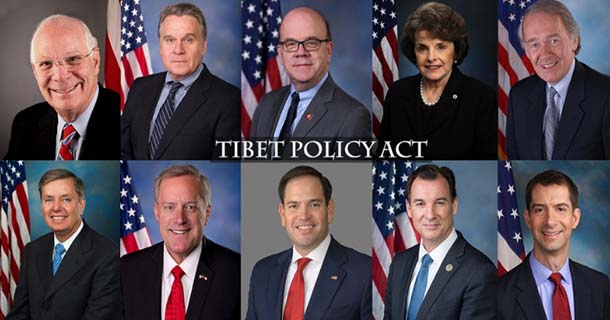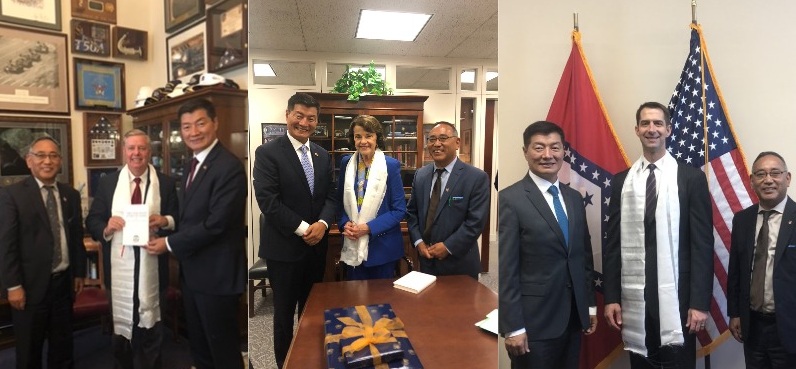The United States of America has been steadily growing as a strong supporter of Tibet. Over the last few weeks, the US has begun taking a consolidated bipartisan stand in support of Tibet.
US Congressional Staffers visited the Tibetan Parliament-in-exile in Dharamshala earlier this month and spoke to Speaker Pema Jungney and Deputy Speaker Acharya Yeshi Phuntsok about long-standing Tibetan issues and were urged to appoint a secretary for the same.
Tibetan Policy and Support Act

The bipartisan Tibetan Policy and Support Act was introduced in the Senate on September 24 by Sen Marco Rubio (R-Fla) and in the House of Representatives on September 13 by Rep James McGovern (D-Mass) This serves as an update on the existing landmark Tibetan Policy Act of 2002.
This revision seeks to address emerging human rights, religious freedom, and environmental challenges faced by Tibetans.
This bill has received enormous support with Tibet supporters and Tibetan Americans taking action this week on a concerted lobbying effort for a special piece of legislation.
They visited the offices of US senators and representatives on Capitol Hill on October 21 and 22 for a mini-Tibet Lobby Day to advocate for the bill. Supporters are taking part in the event by writing letters to their members of Congress. As of the morning of October 18, nearly 12,000 letters had been sent to Congress members asking them to cosponsor the bill, which will dramatically upgrade US support for Tibet.
Support for the reincarnation process
The above bill strongly supports the Tibetans’ right to religious freedom, starting with His Holiness the Dalai Lama’s reincarnation process. If enacted, the bill would impose sanctions and a visa ban on any Chinese official who interferes in the selection of a successor to His Holiness the Dalai Lama. In addition, the bill would require the Secretary of State to seek to establish a consulate in Lhasa. Until then, no additional consulate of the People’s Republic of China in the US will be approved.
USCIRF Support
The United States Commission on International Religious Freedom (USCIRF) welcomed the recent introduction of the Tibetan Policy and Support Act of 2019 (HR4331 / S.2539) and urged the US Congress to swiftly pass it.
USCIRF welcomed the US Department of Commerce’s decision to ban the export of certain technological components to 28 Chinese companies and organisations implicated in the mass internment of Uighur Muslims – the Muslim minority ethnic group living in East Turkestan (Xinjiang) in north west China and who are subject to a similar oppressive regime under China’s rule as Tibetans living in Tibet – as well as the US Department of State’s announcement of visa restrictions for Chinese officials responsible for those abuses.
In its 2019 Annual Report, USCIRF urged the administration to use its authority to enact targeted sanctions against Chinese officials responsible for severe religious freedom violations, especially Chen Quanguo, the Communist Party Secretary of Xinjiang Uyghur Autonomous Region and a member of the 19th Politburo of the Communist Party of China.
Restriction of Chinese Diplomats
The US will impose a restriction on the movement of Chinese diplomats within the US by reporting contacts with specified Americans. Additionally, US Ambassador to China Terry Branstad defended his country’s stand on the issue saying that China has a much more stringent system of regulations. He quoted several instances where US officials were not allowed to visit Chinese law enforcement officials and have had their requests to visit universities turned down.
While unrelated to diplomats, Washington is considering a separate proposal to require employees of “party-controlled entities” – a group that might include state media – to register as foreign agents. This comes amidst possible Chinese efforts to spy or gain influence in US, Australia, and other countries.
Support for pro-democracy protestors in Hong Kong
The first bill condemned Beijing’s intrusions into Hong Kong’s affairs and supported the people’s right to freedom of expression. The second necessitates annual reviews by the US Secretary of State to determine whether Hong Kong hassufficient autonomy from the rest of China to justify its special trading status. The third bill halts sale of riot control gear, including the tear gas used extensively on protestors in Hong Kong. The bill also says the US should allow Hong Kong residents to obtain US visas, even if they have been arrested for being part of non-violent protests.
All three bills were approved on separate voice votes. The bills which received bipartisan support in the house will be introduced in the US Senate.
Speaker Nancy Pelosi said these bills were important reminders of US support for human rights in the face of significant commercial interests in China. Pelosi further added that, while Hong Kong receives special treatment in matters of trade, customs, sanctions enforcement, law enforcement cooperation and more; China has used this special status to evade US export controls and sanctions.

Photo: tibet.net




 Print
Print Email
Email